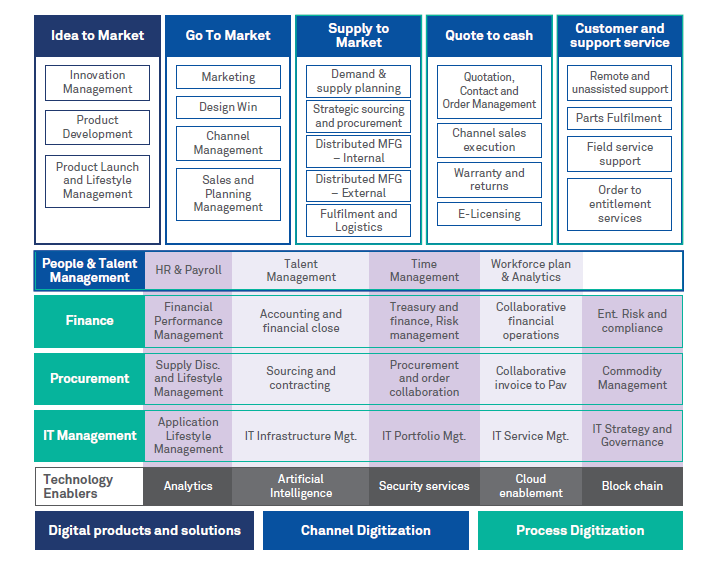The Hi-tech industry essentially enables digital transformation across all industries. Autonomous vehicles are powered by AI enabled chips built by the semi-conductor industry, any enterprise that embarks on a cloud first approach needs to use the cloud platform built by cloud providers, any business process that is being digitized is enabled by software products and similarly consumers who use social media communications and watch video based content depend on high spend networks built by network equipment providers
The digital era brings in tech-savvy consumers that have come to expect newer versions at accelerated rates without compromising on the end user experience. This puts immense pressure on the Hi-Tech industry to continuously offer new / upgraded products with extremely short product lifecycles which cutting edge UI/UX capabilities. They also face stiff competition in this digital-era by new entrants; affecting revenue and profit growth.
As the digital market grows, there is a need to assess investments at every juncture. How and where to implement digital solutions is crucial to get the most return on investments. Increasingly the industry is focusing on service centric solutions instead of the traditional product based offers (e.g. Apple revenue from Services).
The hi-tech industry needs to focus on 3 dimensions to drive revenues and profitability:

Digital Products and Solution
For Hi-Tech companies to help their enterprises and consumers transform into a truly digital business involves more than just adopting technology. Hi-Tech companies need to leverage design thinking to re-imagine both the user experience as well as the industrial design of their products, further they need to re-architect their products to seamlessly integrate into the cloud eco-system, lastly they also need to provide enterprises with business and operational insights on how their products are being utilized by end users.
As companies adopt digital transformation, there is a constant improvement in UI/UX of the products. Enabling the development of an agile product poses the challenges of evolving user interfaces and complex supply chain relationships. The cloud-based services enable companies to provide value across the product development life cycle, customer service and also in the implementation of smart factories. Insights-as-a-service provides companies the much-needed evaluation of their products wherein, the most efficient system or product can be selected for company growth.
At Wipro help our clients in offering Digital Products and Solutions by complementing our Product Engineering Services with Design thinking through our acquisitions of Designit & Cooper. As an example we redesigned the collaboration product suite for one of our clients to enrich the collaboration experience and drive increased user adoption, similarly we have built an analytics solution that builds insights on the telemetry data captured through the usage of the client's product.
Channel Digitization
The hi-tech industry relies on channel partners to market and sell their technology and solutions to end customers. In order to deliver the right experience for channel partners companies are investing in building portals and creating new service models. The shift from a product-centric to service-centric model involves an overhaul of service design of the core organizational structure. The implementation of the servitization platform looks at redesigning marketing, sales, billing and associated services to support subscription models from fixed licensing models.
For instance, we recently engaged with one of our Health Tech clients to redesign and implement the entire set of processes and applications within the Idea to Market domain to increase revenue growth in the subscription economy
Operations Digitization
In the quest for operation efficiency, companies in the global hi-tech industry are digitizing their core front office and back office processes. Some companies are using robotic process automation (RPA), AI, and advanced analytics to augment their existing processes to drive efficiencies . While in other cases clients are redesigning and subsequently implementing cloud based products to drive this digital transformation.
At the core companies reimagine journeys from both an end customer and agent perspective and then identify opportunities to capture insights, digitize and streamline the business processes. For example, in this day and age, customer support goes beyond being just a call center. Today, customer care is reimagined with automated processes wherein customer issues get proactively resolved even before the end customer is aware of the issue. AI is being used here to assist customer support services through chatbots and also offer cross-sell / upsell opportunities by leveraging AI based recommendation engine.
Wipro leverages its AI platform Holmes and Insights as a Service Platform called Data Discovery platform to help our clients digitize their existing processes. In another scenario, a client wanted to transform their entire set of processes across Sales & CRM, extended ERP, Customer Support, HR. We initially re-imagined these processes for the subscription economy as well as designed the framework to easily enable M&A activities and subsequently we are implementing these functionalities across a set of cloud based products.
Conclusion
Technology advancements continue to disrupt the industry. How businesses adapt to these changes determine the success of a company in this digital environment. Hi-Tech companies that will differentiate themselves are the ones that build their products and solutions, digitize their channels and streamline their business processes based on the needs of their end customers and partners.
David Ranjit William
Digital Head, Technology BU, Wipro Ltd.
David has over 20 years of IT experience working in the Communications & Hi-Tech industry. He is responsible for driving the Digital strategy for the Technology BU at Wipro. As part of this role he is responsible for demand generation, competency building, solution enablement and brand building initiatives for the Digital business within the Technology BU.